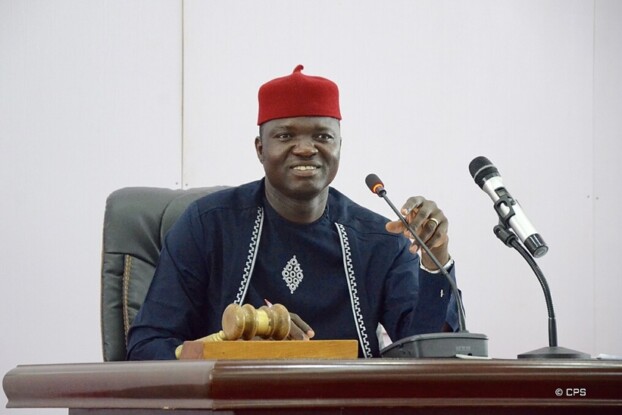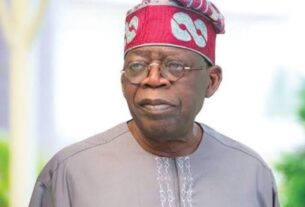Okey Ikechukwu
This is what Governor Francis Ogbonna Nwifuru of Ebonyi said to his colleague governors at the Nigeria Governor’s the other day, after announcing that none of his children was studying outside our borders: “The time has come for us to band together and reposition the educational system in the country. We must identify the shortcomings making our elite opt for foreign options and address them…”. When he said that he was starting from himself and from his state, his statement, and personal action, showed that he was walking his talk.
The governor has challenged every Nigerian parent, and particularly every public official and every stakeholder in the education sector, to look in the mirror and admit whatever they see facing them. The governor’s statement and action also remind us that it is mostly people in leadership positions who, by their actions, pass a Vote of No confidence on our educational system.
Nwifuru has drawn our attention to how the quality of education would benefit from measures that improve the system if we all patronize it. He is talking about the possibility, and availability, of good education in Nigeria, rather that good education in foreign lands as the exclusive preserve of the children of those who can pay for it.
At the same time, he is reminding us that our nation, our people and our children would not become globally competitive if we continue to act in ways that say: “If you want anything good, if you want anything worthwhile and if you want anything that the world would respect, go and get it outside Nigeria”. He is telling us that we cannot be serious about being part of a desperately globalizing world, where Artificial Intelligence (AI) is fast becoming a dominant variable, and leave our nation’s Successor Generation where they are today.
But let us make a slight digression here, before concluding with Governor Nwifuru.
Sometime in February 2023, Abakaliki High School (PRESCO) played host to Development Specs Academy (DSA). The latter had come all the way from Abuja, complete with its Executive Director and three Resource Persons, to deliver a free (Pro Bono), two-day teachers and youth personal development and leadership programme to teachers and students of the school. The programme, titled “Preparing for the Future Today”, and was attracted to Abakaliki by the Principal of the School, Mrs Nnenna Bridget Obasi, who was a secondary school classmate of the Executive Director of DSA. Preparing
The nexus between our programme at PRESCO and Governor Nwifuru’s recent remarks lies in the fact that both share the same concerns about how best to groom the owners of tomorrow for their world; with emphasis on what values to inculcate and what can be done here and now in practical terms. The DSA intervention, which it executes across the country (and free in exceptional cases, like the PRESCO programme) goes beyond issues of the quality of education to responsible citizenship, as well as the how the leadership elite at all levels can maintain a sense of duty and sense of propriety in managing public affairs.
Imagine what would happen in a state where such a programme is made to systematically soak through the grassroots, via Commissioners, Heads of Parastatals, Local Government Chairmen/Counsellors/Ward leaders, Headteachers and even school prefects! We have seen this happen for real, and with incredible positive results all round, for the State Government concerned.
We need a holistic approach to human capital on national development, addressing the connection between effective parenting, formal education and a leadership that nurtures a human ecosystem that guarantees sustainable development. Addressing the weak human capital foundations of the Nigerian state, and the dangers this poses to the future and fortunes of the Federal republic of Nigeria, remain our path to a new Nigeria.
Human capital refers to the resources embedded in a human being, comprising general knowledge, specific skills, exposure and reflexes which add value to the individual in such a way that he can make meaningful economic and other contributions to his society, or his environment. It is the quality of a nation’s human capital that defines its national character. Thus, how this capital is nurtured, by whom it is nurtured, how it is managed, and to what ends it is deployed all have grave implications for national development, national unity and national security.
While it is true that the human being is the primary resource of the nation, it is also true that he does not become an asset until he becomes a citizen. The implication of this is that a newborn child is only a “potential citizen,” to be made a substantive citizen after it has been nurtured in a home, sent to schools, taught certain norms, values and skills, tested for both character and the application of knowledge and then certified (formally and informally) to be of full value.
The home, the school, vocational training platforms and sundry agents of socialization and economic value in a society make up the “factory” used by communities, empires and modern nations to produce this commodity called “citizen”. Parents, teachers, crafts masters and leaders are the factory workers, who use their knowledge and skills to determine the quality of the “end product”.
And the factors determining the final output of a nation`s human capital factory include the following: (1) The condition of the “factory” – the home, school, societal norms, socialization and the policies, moral and role examples of leaders, (2) The capacity of the “factory workers” – parents and teachers – in terms of knowledge, contemporary relevance, etc., (3) The quality and availability of “factory tools” – information, knowledge, skills and character, and (4) The “Quality of processing” – teaching methods, learning outcomes and grooming.
That is why “national character” is defined by the behaviour of a people, especially the signals being transmitted to them by their leaders. Adn the leaders under reference here are parents and all other agents of socialization in the society. That is why a culture of hard work, thrift, responsible human capital development and attention to personal and group development will always create a stable, prosperous and secure nation. And a culture of recklessness, consumption and debauchery will create a citizenry attuned to plundering of the commonwealth at the slightest opportunity.
A nation is only made rich or poor by its human (or national) resources, because minerals and agricultural products (natural resources) can still lead to merciless poverty, as can be seen from the story of Namibia, Zamfara, Venezuela and many other places with abundant natural resources. Japan, the United Arab Emirates and Israel, on the other hand, are examples of how developed human capital can lead to wealth, security and progress in the midst of the harshest material environment.
Thus, a nation with a can be “potentially” wealthy, and will remain so, until it develops combines human capacities with opportunities and its material endowments to create real economic and other values. If it fails to do the needful in this regard, but goes about boasting about its the massive (largely illiterate, unskilled and unhealthy) population, it will remain a possibility and nothing more.
It is important that all institutions of State are seen as “extensions” of the family. They are all designed to act in loco parentis, to guide, support, restrain, reward or punish where appropriate. Every society is essentially an ecosystem that must create, maintain and sustain its own optimal internal environment, or homeostasis, while ensuring that it does not fall prey to other creatures in the food web around it.
In this regard, nation-states act in such a way as to ensure that no other organism creates biological equilibrium in a nearby ecosystem at their expense, or converts them to an item on their food chain, or menu. That is why skills impartation and the transmission of values indoctrination are essential ingredients for the making of a citizen. That is also why it is the duty of the state, as an organism within a determined territory, to resist all “invasive” species that may undermine its optimized ecosystem.
The case of Finland is instructive for us. It used to be a nation of five about million people, whose mainstay and major national preoccupation was agriculture. Then its leaders realized that the road to genuine, and lasting, development, and sustainable national security in the 21st century was to create a better-educated workforce and use human capital development as the main driver of national self-affirmation. Then they focused on new national values, to create a more enlightened workforce, as the best protectors of their national interests.
Today the country has the best education system in the world. It also has many internationally acclaimed technological giants and a national security network that draws more from citizenship loyalty and national consciousness than from military hardware. It is the world`s number one in science and mathematics, while the US is ranked 17th and 21st, respectively, in the same subjects, despite its Silicon Valley hype, great military might, global economic tentacles and military dominance. More baffling still is the fact that Finland spends $3000 less per pupil than the US. The country`s school system records 2% dropout rate, against America`s 25%.
It all happened because an enlightened leadership made sure that a new academic framework curriculum was created, making it mandatory for all teachers to acquire Masters degrees. Knowledge upgrade was facilitated in every way possible, with an eye on excellence. When they realized that that three teachers per class would give better learning outcomes, they went ahead to train more teachers, until they met the target of three teachers per class. Of the three teachers in every class, two teachers focused on instruction while the third focused on students who are struggling with learning challenges.
This is real!
It was not luck, the burying of live cows, speaking in tongues, the laying of hands, weekend-long night vigils in prayer houses or holy water and the carrying of religious objects that made it happen for Finland, no! It is their efforts, not sacrifice to their ancestors, that has made their classrooms a very relaxed learning environment, with the average student speaking four languages. It was also not a special task force, or a yearly summit on how to move education forward, that got all parents involved in enforcing a national culture that values education and reward for meaningful engagement.
We are therefore left with these inevitable challenges, with regard to developing human capital for national security in Nigeria today, which Nwifuru’s remarks brought to the fore, namely: (1) We do need enough responsible parents, knowledgeable teachers and nationalistic leaders, (2) We need proper socialization and sound morals, not distorted by many wrong role models, (3) We need not continue using hypocrisy like a walking stick for anyone who wants to move up in the society.
In addition, we should stop creating dangerous demographic divides between those who are products of foreign schools, those who are products of private schools, those who are products of public schools, the skilled but unschooled and the unschooled and unskilled. These various demographic groups do not have the same ideas about national interest and, therefore, work at cross purposes.








